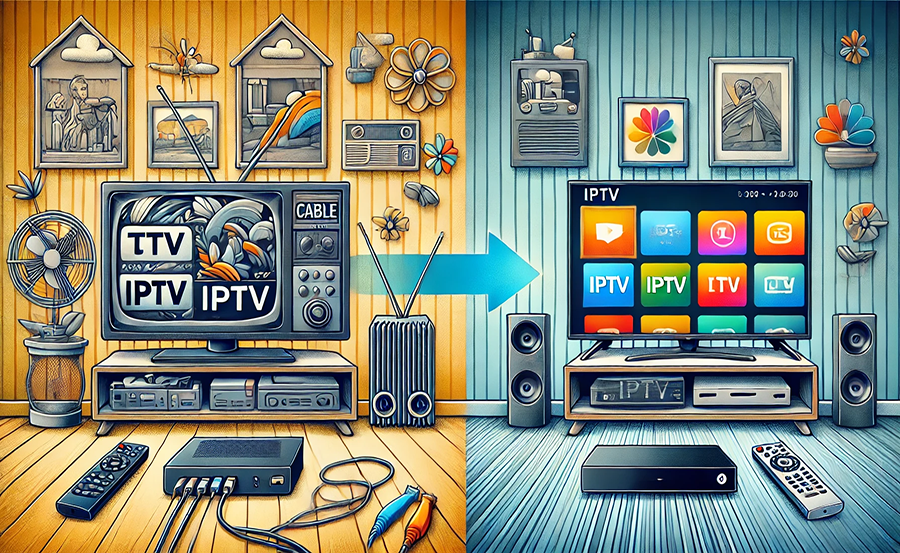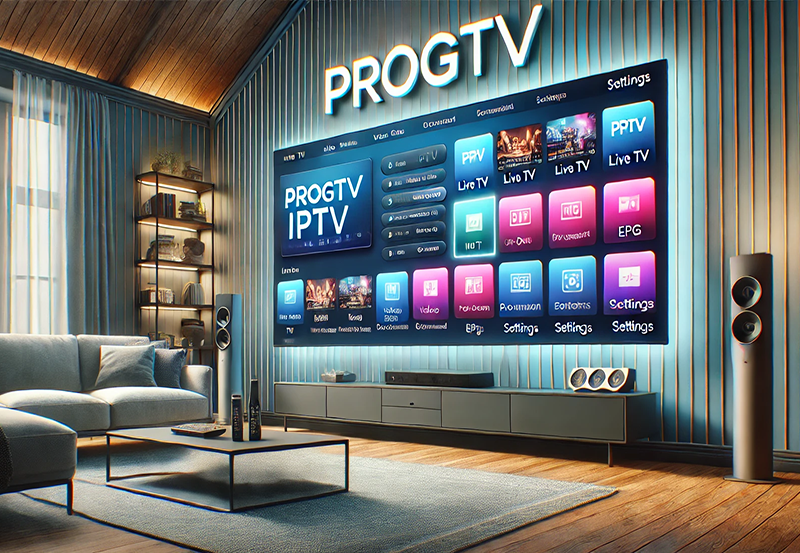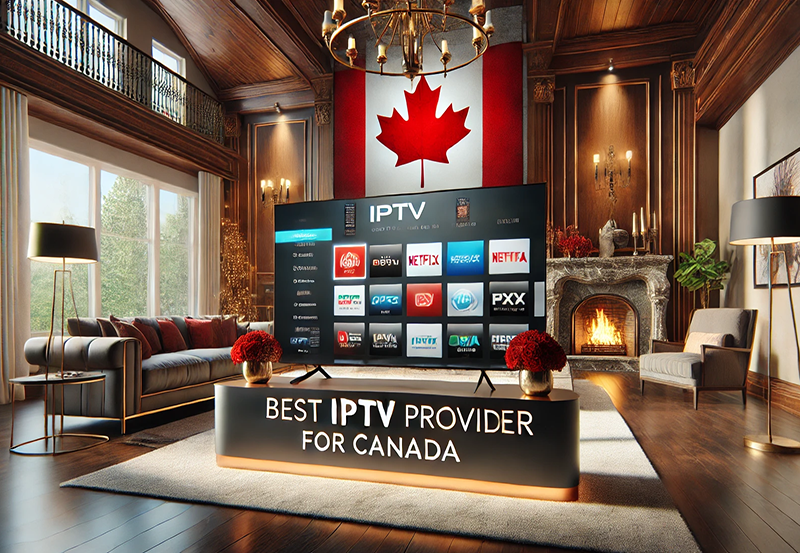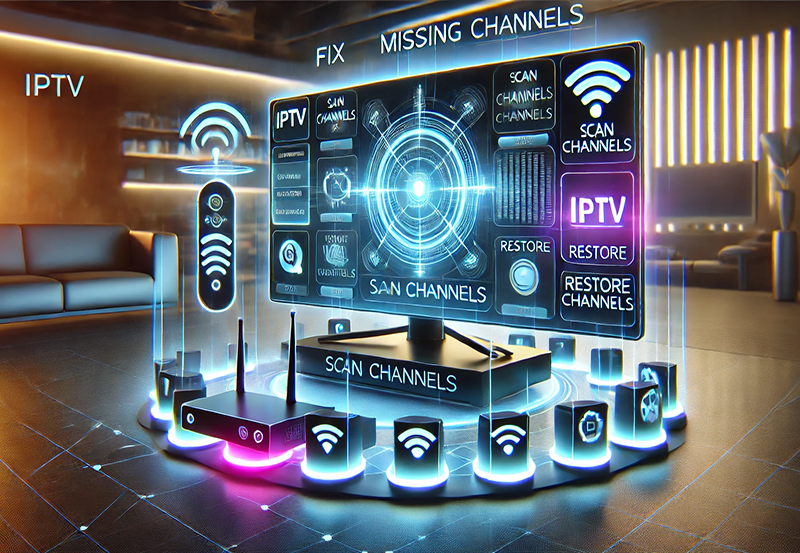In today’s world, technology evolves at an unprecedented pace. As we navigate the rapidly changing landscape of how we consume media, IPTV (Internet Protocol Television) has emerged as a frontrunner, challenging the long-standing dominance of traditional cable. But why is this digital evolution gathering so much momentum, and why should you consider making the switch? Let’s dive into the multifaceted world of IPTV and explore why it’s taking over.
The Rise of IPTV
Before delving into the details of IPTV, it’s crucial to understand its foundations. Internet Protocol Television essentially refers to the delivery of television content over IP networks. This paradigm shift away from satellite or cable signals leverages the internet to provide a diverse range of content.
So, why is IPTV becoming the preferred choice for many households and businesses? There are several factors contributing to its rise. Firstly, the increasing demand for affordable IPTV solutions marks a significant departure from the high costs traditionally associated with cable packages. Moreover, IPTV offers unparalleled flexibility and access to a broader array of channels and content.
Quick Suggestion:
Upgrade your viewing experience with Best IPTV USA, designed for flawless streaming of your favorite content.
The Technology Behind IPTV
At its core, IPTV employs a complex framework of protocols to stream content seamlessly over the internet. Utilizing a robust infrastructure, IPTV providers can offer high-quality video without the interruptions often associated with traditional broadcasting methods.
This system relies on efficient bandwidth management and adaptive streaming technologies to ensure that viewers get the best experience possible. As a result, users can enjoy the best IPTV channels without buffering or latency issues.
The Architecture of IPTV Networks
Understanding the architecture of an IPTV network reveals the intricacies of its operation. Unlike cable networks, which rely on a predefined broadcast schedule, IPTV networks are designed to be interactive and on-demand.
This flexibility is made possible through a combination of multiple components, including media servers, middleware, and user-end devices. Each element plays a critical role in delivering an efficient IPTV service that surpasses its traditional counterparts.
Benefits of IPTV Over Cable
As IPTV becomes more popular, its advantages over cable become increasingly evident. From cost savings to superior content delivery, IPTV offers several benefits that make it an attractive option for consumers.
Here’s a closer look at some of the reasons why IPTV is quickly gaining an edge over cable:
- Cost-Effectiveness: With subscription fees that are often lower than traditional cable, affordable IPTV is accessible to a wider audience.
- Diverse Content: IPTV platforms offer a wide variety of channels and on-demand content, giving users more choices than ever before.
- Interactivity: Unlike cable, IPTV provides interactive features like live pause, rewind, and personalized content recommendations.
- Globally Accessible: With IPTV, geographical restrictions are minimal, allowing viewers to access global content with ease.
User Experience: Personalization and Flexibility
One of the standout features of IPTV is its ability to offer a personalized viewing experience. Unlike cable, where content is dictated by concurrent broadcast schedules, IPTV allows viewers to choose what they watch and when.
This personalization extends to user interfaces, where viewers can customize their viewing experience, from channel selections to feature settings. Discover superior IPTV viewing that transforms how and when you engage with content.
IPTV’s Role in Today’s Media Consumption
The modern viewer demands more control over their media consumption. IPTV meets this demand with on-demand services and customizable viewing options. This increased control is driving a surge in content consumption via IPTV platforms.
Moreover, as IPTV integrates with other online services, such as social media and news apps, it becomes a more centralized hub for all digital content needs, making it an essential tool for today’s user.
Challenges Faced by Traditional Cable
The traditional cable industry is grappling with several challenges that are pushing consumers towards IPTV. Cable companies struggle to keep up with the fast-paced evolution of technology and consumer demand.
Among the challenges are high subscription costs, limited content options, and rigid service structures that offer little in the way of personalization or flexibility.
Limitations of Cable Packages
Cable has long been criticized for its rigid packages, which often include channels that users do not watch. This lack of choice contrasts sharply with the flexibility of IPTV, where users can tailor packages to match their interests and preferences.
Additionally, the advent of streaming services has further exposed the limitations of traditional cable as consumers become accustomed to on-demand viewing and ad-free experiences.
Adapting to Consumer Behavior Changes
Consumers are increasingly looking for content delivery that suits their lifestyle. This shift in behavior presents a significant challenge to traditional cable providers, who must rethink their operations to retain customers.
While some cable companies are attempting to innovate by offering hybrid services that incorporate elements of IPTV, these efforts often fall short of the comprehensive solutions provided by dedicated IPTV services.
Implementing IPTV for Business and Entertainment
Beyond household use, IPTV is increasingly finding application in business and entertainment sectors. Its adaptability and wide-ranging capabilities make it suitable for various professional environments.
From corporate communications to enhanced hospitality services, IPTV provides value-added solutions that are both cost-effective and efficient.
Corporate Uses of IPTV
In the corporate world, IPTV is revolutionizing communications. Businesses are leveraging IPTV technology for employee training, company-wide broadcasts, and public announcements. It offers a versatile platform for delivering multimedia content that engages employees and enhances collaboration.
Moreover, by utilizing IPTV for internal communications, businesses can save on costs usually associated with physical meetings and training sessions.
Enhancing Hospitality Experiences
The hospitality industry is also benefiting greatly from the integration of IPTV. From offering guests a vast range of entertainment options to providing hotel-specific services, IPTV elevates the in-room experience and adds a layer of interactivity.
This personalized service, powered by IPTV, can create memorable experiences for guests, potentially leading to higher customer satisfaction and increased brand loyalty.
The Future of IPTV
As IPTV technology continues to evolve, its future looks promising. Innovations in streaming technologies and internet infrastructure improvements indicate continuous growth and better service offerings.
Looking forward, IPTV is expected to integrate more deeply with emerging technologies such as artificial intelligence and data analytics to both personalize and enhance the viewing experience.
Emerging Technologies and IPTV
The integration of AI into IPTV services is already starting to unlock new potentials. AI can analyze viewing habits to suggest content that aligns with user preferences, taking personalization to the next level.
Additionally, the evolution of 5G technology promises to eliminate bandwidth concerns, further boosting the efficiency and quality of IPTV services globally.
IPTV as a Sustained Trend
With these technological advancements, IPTV is not just a passing trend but a sustainable solution that continues to redefine how we consume media. As more households and businesses turn to IPTV, its market presence is likely to expand, paving the way for even more innovative applications and services.
For companies and consumers alike, embracing IPTV signifies embracing the future of media consumption—a shift that is not just a matter of convenience, but a strategic move to stay ahead in the digital age.
Frequently Asked Questions

What is IPTV and how does it work?
IPTV stands for Internet Protocol Television, a method of delivering television content over IP networks. Unlike traditional cable or satellite signals, IPTV streams videos through internet connections, allowing for on-demand and live programming.
Is IPTV more cost-effective compared to traditional cable?
Yes, IPTV often provides more affordable packages than traditional cable. With fewer infrastructure costs and more customizable service options, IPTV can offer significant savings to consumers.
What are the best IPTV channels available?
The best IPTV channels vary depending on service providers and user interests. Typically, popular IPTV services offer an expansive selection that includes sports, movies, news, and international content.
Can IPTV integrate with other smart technologies?
Absolutely. IPTV services are increasingly integrating with smart technologies such as AI and voice assistant ecosystems to provide a more seamless and interactive viewing experience.
How is the quality of IPTV content compared to cable?
With adequate internet bandwidth, IPTV can deliver high-quality video streams that match or even exceed the quality of traditional cable, often with added benefits like HD or UHD quality.
Is IPTV suitable for professional environments?
Yes, IPTV is widely used in professional settings for purposes such as corporate communication, training, and customer interaction in industries like hospitality and retail.
Are there any geographical restrictions with IPTV?
While IPTV minimizes geographical restrictions, regional content licensing agreements may still apply. However, many providers offer options such as VPN access to expand viewing possibilities.
How to Set Up Roku Streaming on Any TV for the First Time





